Refreshing to see the number of films being released that are not only rooted in Judeo-Christian principles along with historical and biblical context, but break new ground with different perspectives on the telling of the story of Jesus Christ; be it the resurrection as seen through the eyes of a Roman soldier in “Risen”, the true story of a miracle that saved the life of a 9-year old girl in “Miracles From Heaven” or the untold/unknown story of Jesus as a young boy in THE YOUNG MESSIAH, each succeeds in its storytelling and filmmaking, embracing believers and non-believers alike.
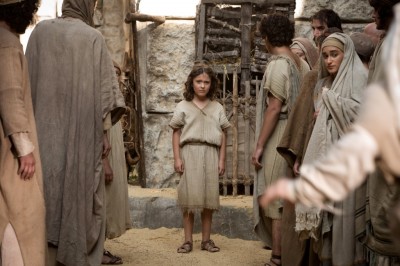
Based on the novel by Anne Rice, THE YOUNG MESSIAH is a fictionalized story of the seven-year old Jesus of Nazareth as he comes of age in learning of his pre-ordained destiny. Directed by Cyrus Nowrasteh, and written by Nowrasteh and Betsy Giffen Nowrasteh, we first meet the young Jesus as he is being bullied by other children in the neighborhood. While he appears to be like every other boy playing in the streets, as we quickly see, there is something “different” about Jesus as he sees, or is haunted by the vision of, a blonde-haired goateed man only he can see. As boys-being-boys turns into a fatal trip and fall for one, fingers point to Jesus as causing the accident while Jesus insists it was this “man” who made the other boy trip and fall. As he is accused of lying about “the man”, his family and neighbors are in an uproar, while Jesus’ cousin pushes him to “make it right. Save the boy like you did the bird.” And thus, we bear witness to an early miracle in the life of Jesus, a miracle which causes more than concern for parents Mary and Joseph.

Thankfully, Joseph has his own vision or dream – that King Herod has died – which means the family can now return to Nazareth. As they make their way back to Nazareth, Herod’s son has taken the throne and is as bloodthirsty as his father (not to mention more than a bit insane) and has heard news of this child who performs miracles. Needless to say, young Herod wants the child killed. Calling on his most trusted centurion Severus, he tasks Severus with finding the child and killing him; something that doesn’t sit well with Severus who is having his own crisis of conscience for his participation in the slaying of children seven years earlier, ironically at the time when Jesus was born.
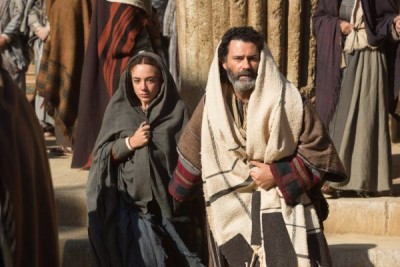
As Jesus and his family, including his Uncle Cleopas (who serves an important role in Jesus’ spiritual training), make their way to their old home in Nazareth, events occur, paths cross and truths are revealed, putting into motion the ideals of faith, forgiveness and redemption, and setting the stage for the promised future.
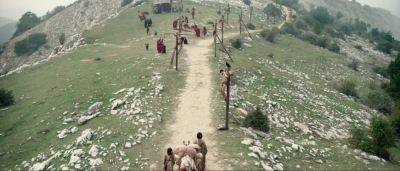
One look at Adam Greaves-Neal face and you see innocence and purity radiate from him, giving Jesus the perfect cherubic look of naivete and wisdom-laced amazement. The young actor finds a touching balance in portraying what Jesus knows of God thanks to the teachings of his rabbis and his parents, plus Jesus’ own love of God, without knowing his lineage to Him, all which is wrapped in a blanket of the unbridled joy of being a child. This is a defining role in this young man’s career and should serve as a stepping stone to even bigger turns in the future. Adding to the believability of the performance is Greaves-Neal’s chemistry and interaction with Finn Ireland as brother James, creating a palpable friendly sibling rivalry that reminds us that Jesus is just a child, learning right from wrong and how to treat others, as he matures into the Saviour. Well done from the standpoints of both performance and script.
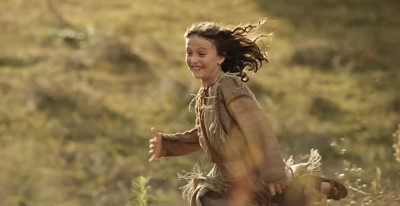
Along the same vein as Greaves-Neal, Finn Ireland is a standout as James. He perfectly captures the sibling jealousy between James and Jesus, but has a nice transformative arc which he embodies nicely.
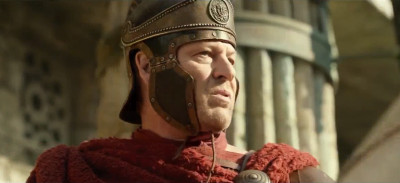
The strongest performance within the fabric of THE YOUNG MESSIAH comes from Sean Bean. As Severus, he commands the screen with his presence both emotionally and physically, while infusing an unspoken sensitivity into not only Severus, but the story as a whole. His eyes and facial expressiveness are telling of the crisis of conscience Severus has over not only his participation in the slaughter in Bethlehem seven years ago, but in the new order from Herod to find and kill this child with the little carved camel. Noteworthy is that as with the recent “Risen”, focusing on a main character with a the viewpoint as a Roman “non-believer” works wonderfully as setting the stage for “either-or” and a broader understanding of the big picture to see hardened men question themselves and their path in life. Bean embodies the essence of this as Severus.
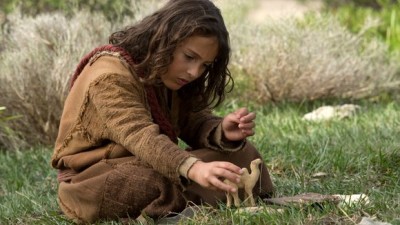
Jonathan Bailey is the epitome of insanity and sleaze (not to mention providing some comic relief inherent to the character’s persona) as young Herod while Rory Keenan as the Demon seen only to Jesus (and the audience) is downright creepy and chilling. Having said that, my one issue with the introduction of the Demon is the fact the audience – of which there will be many unfamiliar with Scripture – aren’t going to fully comprehend his presence or comprehend the “the devil is everywhere and can manifest himself as anyone” metaphor. There is no exposition to fill in the blanks. It is however, extremely effective as a showcase for young Adam Greaves-Neal’s abilities in reacting with fear and terror to what he doesn’t understand.

Scene stealing is Christian McKay as Cleopas. While a voice of reason and means for some light humor, McKay is beyond believable as an uncle who loves his nephew and a man who loves his brother, but he brings great conviction – without forcing it down our throats – into voicing what everyone is thinking – why aren’t you telling Jesus who he really is. McKay is robustly exuberant in the role.
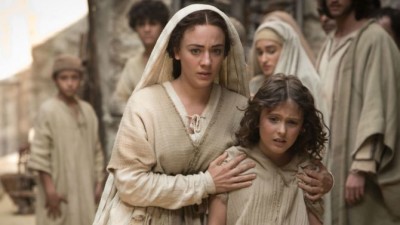
Disappointing is Sara Lazzaro’s Mary. Lazzaro’s acting is fair, but where director Cyrus Nowrasteh really misses the mark and makes Lazzaro almost unbearable is with far too many lingering camera shots on a woman who says little and has a panic stricken look on her face for the entire film. It is both disturbing and distracting. And until the final few minutes of the film, what dialogue Lazzaro does have is, for lack of a better term, lame. The part was very underwritten. Similar is Agni Scott’s Miriam. Again, poorly written part that really has her portrayed as a shrew, which to her credit, Scott perfectly portrays to the point of one wanting to reach into the screen and slap her face.
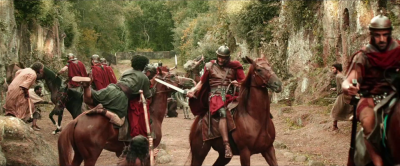
A beautifully lensed and constructed film, THE YOUNG MESSIAH is a case where location is everything. Here, thanks to producer Chris Columbus, historic locations were secured in Matera which, in and of itself, is not only breathtaking, but adds elements of historical grandeur and authenticity.
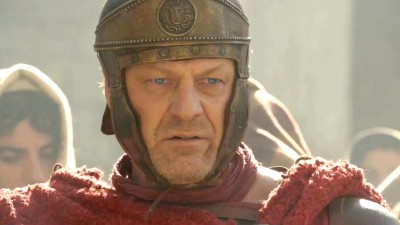
And speaking of the locations – and the light and how it diffuses in Italy – kudos to cinematographer Joel Ransom. Shooting with natural light, most appreciative is that writer/director Nowrasteh didn’t go crazy in post with color saturation; he remained true to the colors of the time with a dusty tinge and beige/brown hues to everything. By sticking to natural colors, the film breathes with the lighting and lensing and allows for the emotional impact that comes with some of the key moments involving our little Messiah as he looks to God above. Some judiciously used sun flares and transitory clouds add a touch of Cecil B. Demille reminiscent of some sequencing in “The Ten Commandments.” But, having said that, there are two instances where the extended clouds above/heaven metaphor are too drawn out and punctuated with some heavy scoring interludes from composer John Debney which drags the film down with feelings of a depressing melodrama.
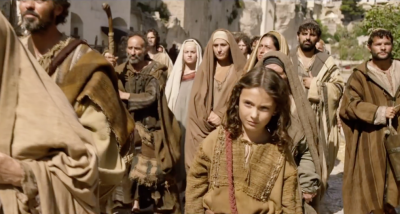
Debney’s score is for the most part, soft and beautiful, with a gentility to it but for some moments as mentioned above which when compounded with the overly done and extended Demille-esque transitions, takes you out of the moment of the innocence and joy of childhood, even when that child is Jesus.
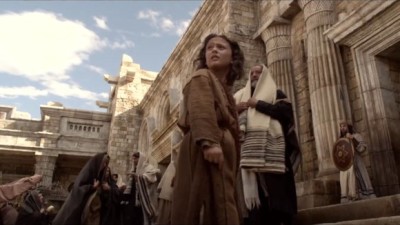
THE YOUNG MESSIAH is a film for believers and non-believers alike. But for a few issues Columbus, Nowrasteh and company have done a loving job of telling a story no one has told before; believably stretching the imagination but finding that balance of history and theology that crosses the religious demographic lines, appealing to believers and non-believers alike, not to mention movie-goers who just want to see a well done film.
Directed by Cyrus Nowrasteh
Written by Cyrus Nowrasteh and Betsy Giffen Nowrasteh based on the novel by Anne Rice
Cast: Sean Bean, Adam Greaves-Neal, Finn Ireland, Christian McKay, Jonathan Bailey, Rory Keenan, Sara Lazzaro












